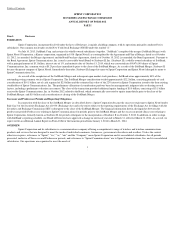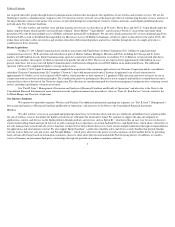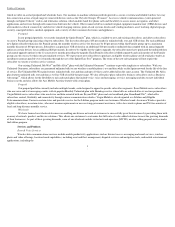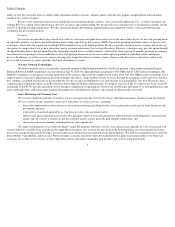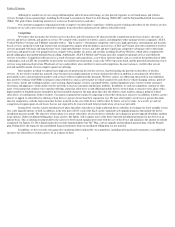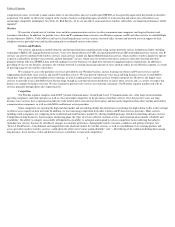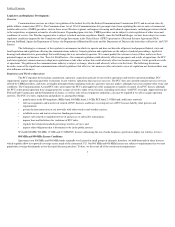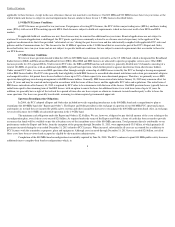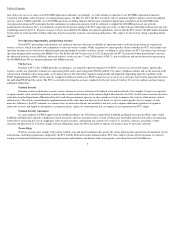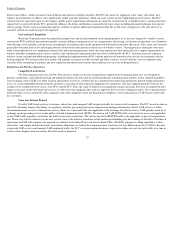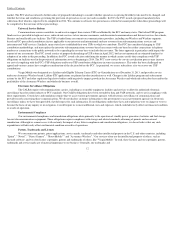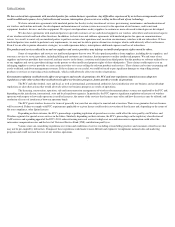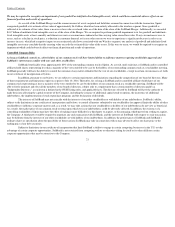Sprint - Nextel 2013 Annual Report Download - page 13
Download and view the complete annual report
Please find page 13 of the 2013 Sprint - Nextel annual report below. You can navigate through the pages in the report by either clicking on the pages listed below, or by using the keyword search tool below to find specific information within the annual report.
Table of Contents
International Regulation
The wireline services we provide outside the U.S. are subject to the regulatory jurisdiction of foreign governments and international bodies. In
general, we are required to obtain licenses to provide wireline services and comply with certain government requirements.
Other Regulations
Network Neutrality
On December 22, 2010, the FCC adopted so
-
called net neutrality rules. The FCC rules for fixed broadband Internet access services consisted of: (a) an
obligation to provide transparency to consumers regarding network management practices, performance characteristics, and commercial terms of service; (b) a
prohibition on blocking access to lawful content, applications, services and devices; and (c) a prohibition on unreasonable discrimination. The FCC
acknowledged, however, that mobile broadband faced different constraints and adopted lesser obligations for mobile providers. Accordingly, the rules for
mobile broadband operators required that they: (a) provide transparency to consumers in the same manner as fixed providers; and (b) not block access to lawful
websites and applications that compete with the provider's own voice or video telephony services. Other rules applicable to fixed broadband, including no
blocking of other applications, services or devices, and the prohibition of "unreasonable discrimination," did not apply to mobile providers. On January 14, 2014,
the U.S. Court of Appeals for the District of Columbia Circuit vacated the FCC
’
s "no
-
blocking" rule for fixed and mobile operators and the "no unreasonable
discrimination" rule for fixed providers. The court left in place the "transparency" rule applicable to both fixed and mobile operators. The court
’
s decision left
open the possibility that the FCC could alter its legal foundation and reenact the vacated rules. Because the net neutrality rules applicable to mobile broadband
were relatively narrow and because we have deployed open mobile operating platforms on our devices, such as the Android platform created in conjunction
with Google and the Open Handset Alliance, the rules, if reenacted by the FCC under a permissible legal foundation or otherwise brought back into force,
should not adversely affect the operation of our broadband networks or significantly constrain our ability to manage the networks and protect our users from
harm caused by other users and devices.
Truth in Billing and Consumer Protection
The FCC's Truth in Billing rules generally require both wireline and wireless telecommunications carriers, such as us, to provide full and fair disclosure
of all charges on their bills, including brief, clear, and non
-
misleading plain language descriptions of the services provided. In response to a petition from the
National Association of State Utility Consumer Advocates, the FCC found that state regulation of CMRS rates, including line items on consumer bills, is
preempted by federal statute. This decision was overturned by the U.S. Court of Appeals for the Eleventh Circuit and the Supreme Court denied further appeal.
As a consequence, states may attempt to impose various regulations on the billing practices of wireless carriers. In addition, the FCC has opened several
proceedings to address issues of consumer protection, including the use of early termination fees, the FCC has opened an investigation into "bill shock"
concerning overage charges for voice, data and text usage, and has proposed new rules to address cramming. The wireless industry has proactively addressed
many of these consumer issues by adopting industry best practices such as the addition of free notifications for voice, data, messaging and international
roaming to address the FCC's bill shock proceeding. If these FCC proceedings or individual state proceedings create changes in the Truth in Billing rules, our
billing and customer service costs could increase.
Access Charge Reform
ILECs and competitive local exchange carriers (CLECs) impose access charges for the origination and termination of long distance calls upon
wireless and long distance carriers, including our Wireless and Wireline segments. Also, interconnected local carriers, including our Wireless segment, pay to
each other reciprocal compensation fees for terminating interconnected local calls. In addition, ILECs and CLECs charge other carriers special access charges for
access to dedicated facilities that are paid by both our Wireless and Wireline segments. These fees and charges are a significant cost for our Wireless and
Wireline segments. In November 2011, the FCC adopted comprehensive intercarrier compensation reforms, including a multi
-
year transition to a system of bill
-
and
-
keep for terminating switched access charges. These reforms have decreased and are expected to continue to decrease our terminating switched access
expense over time.
In 2012, the FCC released an order freezing the existing special access pricing flexibility "triggers," and another order requiring parties to submit
information needed to assess the level of competition in the special access
11


